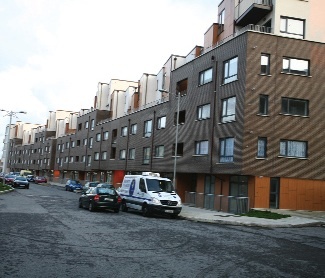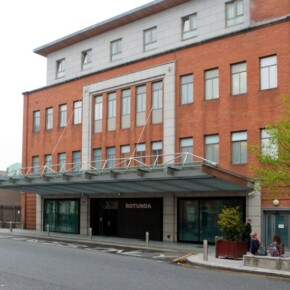Priory Hall is a clear case for debt forgiveness
Dublin People 22 Oct 2011
WATCHING
last week’s
‘Prime Time’ coverage of the Priory Hall debacle, it was impossible
not to be moved by the sight of the displaced residents – many of them with
babies on their laps – gathered together in the Regency Hotel.
For
those renting apartments at Priory Hall, last week’s evacuation order was no
doubt a traumatic and disruptive experience.
However,
the situation for owner-occupiers is far more serious and one that will require
the mechanism of various State agencies and financial institutions to resolve.
Many
young couples bought apartments in places like Priory Hall in the expectation
of getting a foothold on the property ladder. Some probably planned to trade up
to larger homes as their families expanded.
Even
before the fire safety scandal, this had become an impossible dream as the
property market crashed and negative equity became the new reality.
Thousands
upon thousands of homeowners around the country are now in this position. And
as this month’s Keane report on mortgage distress found, there is no magic
bullet solution and the prospect of blanket debt forgiveness is, quite
understandably, not a runner.
Clearly,
however, there is scope for distressed mortgages to be looked at on a
case-by-case basis. And where better to start than Priory Hall?
Is
it unreasonable to expect financial institutions to carry out proper due
diligence or adequate surveys before giving out loans on properties like Priory
Hall?
Should
the local authorities have been sufficiently funded by successive Fianna Fáil
led governments to ensure that adequate inspections were carried out on all new
developments? After all, they were raking it in at the time from stamp duty and
development levies so it’s not a case that the money wasn’t there.
Local
Senator Averil Power (FF) was on the right track last week when she proposed a
freeze on monthly mortgage repayments for Priory Hall homeowners until such a
time that remedial works are carried out and the apartments are once again fit
for habitation.
But
the mortgage holiday proposed by Senator Power would only provide a stopgap
solution to what is a longer-term problem.
In
my view, this is what needs to happen. Qualified, talented tradesmen should be
taken off the dole queues – even on a short-term basis – and tasked with
bringing the apartments up to full building regulation spec.
Once
the apartments are fit for purpose, those who took out mortgages should have
the option of handing back the keys to their lenders and walking away from
Priory Hall without any further liability.
They
would lose whatever they have already paid but would now be debt free and –
crucially – have the option to start again. Those who choose this option could
be offered loans from NAMA to facilitate the purchase of vacant properties on
their books (at 2011 prices!).
As
for the financial institutions, the newly vacant apartments could be rented out
privately by them or used for social housing by the local authority.
Effectively they would become landlords and get rent instead of mortgage repayments.
Equally,
those who are happy to return to Priory Hall and continue paying their mortgage
should be facilitated. However, the amount outstanding would need to be heavily
discounted on account of the drop in value that these apartments will most likely
suffer as a result of all the negative publicity.
This
way, everyone shares some of the pain – including the residents themselves.
On
Friday, the High Court President, Mr Justice Kearns, asked banks and other
lending institutions to take account of the difficulties faced by those with
Priory Hall mortgages.
And
Housing Minister Willie Penrose said last week he would like to see NAMA
providing a social dividend.
Let’s
hope this turns out to be the case because how the Government and the lending
institutions end up dealing with the residents of Priory Hall will say
everything about how we want to be viewed as a society.
It
is a question of social justice, one that asks: what type of country do we want
to raise our children in?











